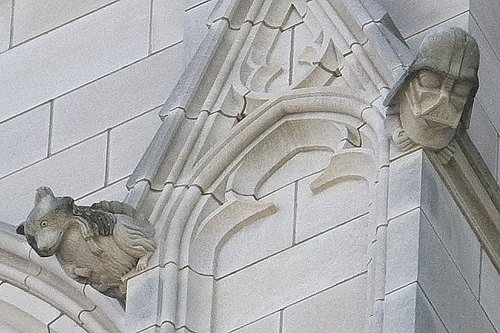zombie84 said:
I think one of the main things is that Star Wars came out at a time when there was not the hyper-saturated media of today; there were few blockbusters and no contemporary mythological things, and nothing that was truely "universal" at the time in that everyone could connect to it regardless of age or gender or whathaveyou. Today we have Harry Potter, which is the closest that has probably come to matching Star Wars in that respect, but it's also lost in the sea of media: there's a million other blockbusters, like Batman and Lord of the Rings and the continuing Star Wars spinoffs (prequels included), plus cable television with a devoted channel for every genre and niche, not to mention VHS, DVD, Blu-ray and torrents making every single film ever made available, in high definition much of the time, plus Youtube, Facebook, and the internet clammoring for attention. Plus, video games are huge, and have replaced a lot of traditional media like film and television to a degree--there were games in 1977, but no standout titles other than maybe stuff like Pong and Space Invaders (did this come out after SW? I know it was around in 1977), but you didn't have them in your home for the most part.
So, Star Wars really is the first and last of its kind. It's hard to say if The Matrix and Harry Potter will be remembered in 60 years from now, other than aging original-generation fans and maybe classic literature/cinema fans, just because these types of blockbusters have become rather disposable today, and this will only increase in the future as more media options become available and the market continues to fragment. Star Wars didn't have that. Star Wars didn't even have multiplexes to contend with--your town had one theatre, with one screen, and what was playing was Star Wars. So everyone saw it, and it was everywhere, in magazines and the news and on SNL and such.
Consequently, Star Wars has become a lasting part of popular culture, even if increasingly fewer people will actually be watching the films. It's like Superman or Wizard of Oz--most people have never read a Superman comic, most people have never read the Oz books, and there are increasingly large amounts of people who have never seen any of the film or television adaptations of either franchises. But they still know the mythology. The know about Dorothy and Tin Man and Munchkins, they know about Superman's costume and Lois Lane and Clark Kent, and people likewise know all about Luke Skywalker and Darth Vader and the Death Star and the Force.
Is it on the same level as the Bible or classical mythology? In the contemporary sense, probably yes. More people today have probably seen Star Wars than actually read all, or even a significant part of, the Bible, especially as young people are leaving tIhe church at a record-setting pace. People know who Obi Wan Kenobi or R2D2 are, but unless they really know their Bible or go to sunday school they probably don't know a character/person like King Josiah. Harry Potter outsells the Bible today (no joke). But of course, that is just because western society has become increasingly less tied to religion and superstition, and this trend will only continue (unless you live in the so-called Bible Belt, in which case it's harder to predict if the current religious furver will last or decline in the near future, as it has tended to be cyclical there).
On a historical scale it would be absurd to argue any of this though, as was mentioned for a good thousand years the only thing that really tied Europe together from end to end was Christianity and the vestiges of classical religion spread through the influence of the former Roman Empire. It's pretty unlikely that many people will know about Star Wars in the year 3000, although I would say if people study early film like they do early literature (canterbury, etc), Star Wars would be a contender for somewhere at the top of that list but I imagine that would be more for historical buffs and academics, the way Canterbury largely is today.
That was an excellent answer. I really enjoyed reading it. However, I have to say that your comparison of King Josiah to R2D2 and Obi-Wan Kenobi is flawed. Those two are main characters. I know the Bible pretty well, and even I barely remember King Josiah. A better comparison would be Moses. And I'm pretty sure the average person knows more about him, than R2D2 and Obi-Wan Kenobi.
In school you actually learn about these things. If your studying Medieval Europe, you'll probably deal with the influence of the Church. If your studying Ancient Greece or the Renaissance you'll probably deal with Classical Mythology's influence in visual arts and on words.
 Need I say more? ;)?
Need I say more? ;)?